Themed collection Charge Generation Mechanism in Organic Solar Cells

Charge generation mechanism in organic solar cells

Phys. Chem. Chem. Phys., 2014,16, 20277-20278
https://doi.org/10.1039/C4CP90132K
Models of charge pair generation in organic solar cells
A critical perspective on modelling of charge generation in organic photovoltaics, focussing on interfacial electronic states, electrostatics, and dynamic processes.
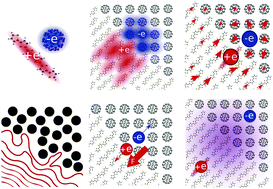
Phys. Chem. Chem. Phys., 2015,17, 2311-2325
https://doi.org/10.1039/C4CP03663H
Charge separation energetics at organic heterojunctions: on the role of structural and electrostatic disorder
This review presents recent theoretical advances regarding the determination of the energetics and dynamics of charge carriers at organic heterojunctions.
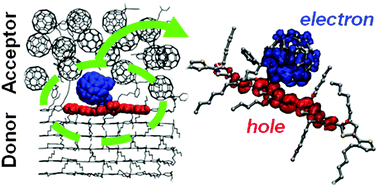
Phys. Chem. Chem. Phys., 2014,16, 20279-20290
https://doi.org/10.1039/C4CP01872A
Charge generation in polymer–fullerene bulk-heterojunction solar cells
We give a broad overview of different mechanisms proposed to explain efficient charge carrier generation in polymer–fullerene solar cells.

Phys. Chem. Chem. Phys., 2014,16, 20291-20304
https://doi.org/10.1039/C4CP01814A
Ultrafast charge separation and nongeminate electron–hole recombination in organic photovoltaics
We extend a model of ultrafast charge separation to incorporate polaron formation, and consider the thermal separation of bound charges.
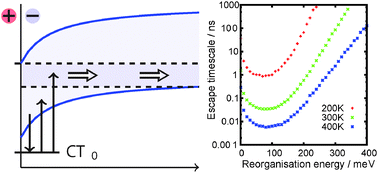
Phys. Chem. Chem. Phys., 2014,16, 20305-20309
https://doi.org/10.1039/C4CP01791A
A designed bithiopheneimide-based conjugated polymer for organic photovoltaic with ultrafast charge transfer at donor/PC71BM interface: theoretical study and characterization
The designed bithiopheneimide-based donor molecule 4 will be a promising candidate for high-performance OPV device due to its ultrafast charge transfer at 4/PC71BM interface.
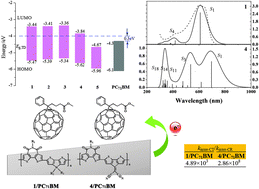
Phys. Chem. Chem. Phys., 2014,16, 25799-25808
https://doi.org/10.1039/C4CP03022B
Are hot charge transfer states the primary cause of efficient free-charge generation in polymer:fullerene organic photovoltaic devices? A kinetic Monte Carlo study
In this paper we use a Kinetic Monte Carlo model to examine whether hot charge transfer states are the primary cause of efficient free-charge generation in organic photovoltaic devices.
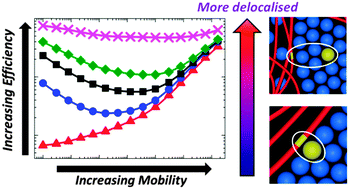
Phys. Chem. Chem. Phys., 2014,16, 20310-20320
https://doi.org/10.1039/C4CP01626B
Charge-carrier generation in organic solar cells using crystalline donor polymers
Crystalline donor polymers can promote delocalization of hole polarons and hence result in highly efficient charge-carrier generation in organic solar cells.
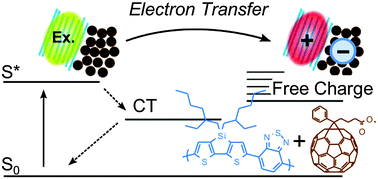
Phys. Chem. Chem. Phys., 2014,16, 20338-20346
https://doi.org/10.1039/C4CP01820F
Control of charge generation and recombination in ternary polymer/polymer:fullerene photovoltaic blends using amorphous and semi-crystalline copolymers as donors
Transient absorption spectroscopy on amorphous and semi-crystalline PPE-PPV copolymers gives insight into the processes governing the photovoltaic device performance.
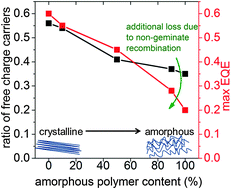
Phys. Chem. Chem. Phys., 2014,16, 20329-20337
https://doi.org/10.1039/C4CP01883D
How disorder controls the kinetics of triplet charge recombination in semiconducting organic polymer photovoltaics
Theoretical models of polymer–fullerene interfaces indicate that inhomogeneous broadening of fullerene energy levels introduces strong coupling between the interfacial 3CT and nearby fullerene triplet excitons that can enhance the decay of these states in systems with higher degrees of energetic disorder.
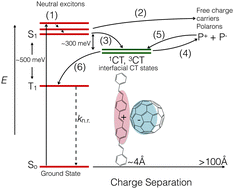
Phys. Chem. Chem. Phys., 2014,16, 20321-20328
https://doi.org/10.1039/C4CP01776E
About this collection
This PCCP themed issue on ‘Charge Generation Mechanism in Organic Solar Cells’ aims to present the best possible snapshot for the state-of-the-art in organic photovoltaics (OPV). One of the fundamental unknown mechanisms in OPV has been the generation of free charges from optically generated excitons, as one expects that bound hole-electron pairs formed at the interface between donor and acceptor materials should not efficiently form free charges. Within the past few years, many important efforts have been directed to the elucidation of this mechanism with a number of high profile papers published using a range of spectroscopic techniques, analysis of device measurements and atomistic models.
This themed issue, guest edited by Alessandro Troisi (University of Warwick) and Maria Antonietta Loi (University of Groningen), seeks to take an important step towards realising a common picture of charge generation mechanism.
New articles will be added to the collection as soon as they are published.